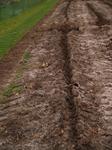Study Agricultural Irrigation Management

Irrigation is now playing a more important role in agriculture than ever before. However, depending on the climate, the value of the plants or animals, the value of the land and it's suitability for irrigation, the cost, reliability and quality of the water supply, irrigation may or may not be possible or feasible.
Irrigation may enable plants (i.e. crops, pasture) to be grown in a dry climate where it would not otherwise be possible, or it may supplement the existing rainfall and improve growth rates by extending the growth period of the plant, or by ensuring there is adequate moisture during critical periods when the plant is growing most rapidly. The value of irrigation can vary greatly from year to year depending on the distribution of rainfall during the growth season.
This ten lesson course is studied by online or distance learning. You can study at your own pace with support from our expert tutors.
The course requires around 100 hours of study.
CONTENT
There are 10 lessons as follows:
Lesson 1: Introduction to Irrigation
- Objectives of Irrigation
- Sources of water
- Water quality and remedies
- Sediment, turbidity, colour, hardness, corrosion, iron etc.
- Bacteriological impurities
Lesson 2: Soil Characteristics and Problems
- Understanding soils
- Different Soils suit different purposes
- Chemical aspects of soil
- Physical aspects of soil
- Soil and Water
- Types of soil moisture
- Transpiration and wilting point
- Identifying the soil
- Improving the soil
- A fee-test for estimating soil moisture level
- Fertigation
Lesson 3: Estimating Plant Needs and Irrigation Scheduling
- When to irrigate
- Signs to look for
- Timing of irrigation
- Measuring water available to plants
- Calculating field capacity
- Calculating Permanent wilting point
- Soil water budget
- Crop Water needs
- Effect of climate on crop water needs
- Measuring evapotranspiration
- Pan evaporation method
- Theoretical method - Blaney-Criddle Method
- Influence of crop type on water needs (crop factor)
- Calculating crop water needs
- Irrigation system efficiency
- Water volumes and duration
Lesson 4: Drainage
- Improving permeability during construction
- Improving surface drainage after construction
- Layout of drains
- Dams and water storage
- Soil degradation
- Erosion
- Soil acidification
- Soil compaction
- Chemical residues
- Waste water treatment using reed beds
- Suitable plants
Lesson 5: Types of Irrigation Systems
- Categories of irrigation systems
- Sub-surface and surface irrigation
- Flood irrigation systems
- Pressurised irrigation systems
- Drip and sprinkler irrigation
- Portable, solid and semi-permanent
- Mechanised sprinkler irrigation systems
- Traveling irrigators, Centre pivot, Linear move, Powered side roll
- Fixed sprinkler systems
- Hand move, hose move, permanent
- Sprinkler heads
- Mechanisms that drive rotating sprinkler heads
- Design considerations
Lesson 6: Trickle Irrigation
- DIY micro-irrigation
- Length of watering
- Automatic watering
- Maintenance of watering systems
- Micro-jet irrigation benefits
- Use of chlorine
Lesson 7: Design Specifications of an irrigation system
- Hydraulics
- Pressure
- Calculating discharge or flow
- Friction loss in systems
- Water hammer
Lesson 8: Pumps and Filters
- Types of pumps
- Comparisons of pumps
- Pumps and pressure systems
- Pumping mechanisms
- Pump failure
- Prevention of clogging - trickle irrigation
- Controllers
Lesson 9: Selecting the Right System for a plant
- Water saving measures
- Filtration
Lesson 10: Design and Operation of Systems
- Cyclic watering
- Pulse watering
- Sprinkler spacing
- Electrical factors
- Electric automatic systems
DURATION: 100 hours
AIMS
- Explain the significance of soil in irrigation.
- Explain how to determine when to irrigate in agricultural situations.
- Manage irrigation in agricultural situations.
- Explain the significance of different aspects of moving water including: drainage, pumps, filters, storage, recirculation, and re-use.
- Select an appropriate irrigation system for a given agricultural situation.
- Explain the principles of design for a simple irrigation system.
- Design a simple irrigation system.
- Oversee the installation of an irrigation system.
Types of Irrigation Systems
Irrigation systems can be designed to supply water for a wide range of irrigation applications, and many different types of irrigation are used around the world. Generally speaking, irrigation can be categorized into broad two categories:
1. Gravity surface flooding systems (flood irrigation)
- Hillside flooding
- Border check
- Furrow irrigation
2. Pressurised systems
- Sprinkler Irrigation – Hand move, side-roll and end-tow, long lateral, permanent sprinklers, travelling irrigators, low-level sprinklers, and Centre pivot and linear move
- Drip irrigation
- Micro-irrigation – micro-jets and mini-sprinklers

These systems can also be described on the basis of whether they are surface or sub-surface irrigation systems.
- Sub-surface irrigation - usually takes the form of dripper lines placed under the soil surface within the root-zone of the plants being irrigated. This form of irrigation is used in cropping enterprises, orchards etc, but is also useful for applications in amenity horticulture where soil disturbance is minimal or avoidable (e.g. lawns and beds for perennial plants).
- Surface irrigation - takes the form of flooding cropping areas or the sprinkler application of water to the surface of the land. Rice production is a notable example of an agriculture form that uses flood surface irrigation. While some applications of this form of irrigation can have additional benefits such as weed control, it requires high volumes of water. Crops such as soybeans can be watered by flood irrigation, but most crops could show a yield decline if water stays on the crop too long or if the soil stays in a waterlogged condition for several days.
Who Is This Course For?
This course is for different people including:
- Farmers
- Farm hands
- Smallholders
- Irrigators
- Irrigation supplies workers
- Agronomists
- Anyone wishing to develop their understanding of agricultural irrigation.
Enrol and discover how to optimise irrigation in any farming situation.
Any Questions?
Our Tutors are more than happy to help. Please click here to contact an Irrigation tutor.